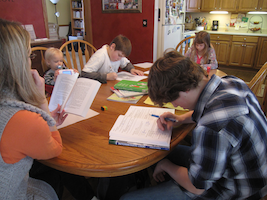Americans have soured on public schools, but there are alternatives.
Americans have soured on public schools. That’s the takeaway from Gallup polling results released earlier this month showing that Americans’ confidence in public schools is at a low point, with only 26 percent of respondents indicating a “Great deal/Fair amount” of confidence in that institution.
Indeed, public schools join three other institutions that are also at or tied with their record lows, including the police, large technology companies, and big business. Along with the presidency, public schools are now among the most politically polarizing institutions in the US.
On a positive note, confidence in small business remained high, topping the list of institutions tracked annually by Gallup. It’s not surprising, then, that more parents are turning away from public schooling and choosing smaller, low-cost private schools and related out-of-system learning models, like homeschooling.
It’s also not surprising that there is growing support among Americans for school choice policies that enable education funding to follow students instead of going to school systems. 2023 has become a record year for school choice, with several states now joining Arizona in passing universal education choice legislation for all K-12 students.
Even in states without robust school choice policies, like where I am in Massachusetts, parents are continuing to choose education options beyond their assigned district schools. This exodus may have accelerated during the school closures of 2020, but it’s hardly disappearing. Demand for alternatives to public schools remains high, and education entrepreneurs are rising to meet that demand throughout the US.
“Families are in search of programs that can deliver personalized, high-quality instruction to their children,” said Ada Salie, who launched a learning center in Massachusetts in 2021 and is opening two additional locations across the state this fall. “As alternative education programs, we can pivot quickly in response to the needs of our students, and allow them to learn in the ways that serve them best.”
Salie’s program, Life Rediscovered, offers full- and part-time programming for homeschoolers, including many who have recently opted out of public schooling. Her program offers a blend of academic support, student-led projects, abundant time outside, and a cohesive, mixed-age community of learners and hired educators. This model is attractive to many families, with Salie’s three locations now at or near capacity.
Salie credits much of her expansion success to grants she has received from the VELA Education Fund, a national, philanthropic non-profit organization that supports entrepreneurial parents and teachers who are building unconventional, out-of-system learning models. Since launching publicly in 2019, VELA has issued grants to more than 2,200 everyday entrepreneurs, totaling more than $26 million. “We would not have had the confidence to go ahead with opening more sites without funding from VELA,” said Salie.
With back-to-school season just around the corner, parents don’t need to be tied to a school assignment that doesn’t meet their expectations. There is a growing number of inexpensive private schools and alternative education models all over the US, representing a wide variety of educational philosophies and approaches. I recently spotlighted 35 of them across five cities, from the busy streets of New York to the quiet crossroads of Grants Pass, Oregon.
Confidence in public schools may be fading at least in part due to their politically polarizing characteristics that inevitably create a battle of wills among diverse constituents with different preferences and worldviews. A decentralized education ecosystem, by contrast, allows families to choose what is best for their children without forcing their preferences upon others.
As faith in large, centralized institutions wanes, look to the entrepreneurs and small business owners who are creating what people want, in education and elsewhere, while reducing polarization and social strife.

Kerry McDonald
Kerry McDonald is a Senior Education Fellow at FEE and host of the weekly LiberatED podcast. She is also the author of Unschooled: Raising Curious, Well-Educated Children Outside the Conventional Classroom (Chicago Review Press, 2019), an adjunct scholar at the Cato Institute, education policy fellow at State Policy Network, and a regular Forbes contributor. Kerry has a B.A. in economics from Bowdoin College and an M.Ed. in education policy from Harvard University. She lives in Cambridge, Massachusetts with her husband and four children. You can sign up for her weekly email newsletter here.
This article was originally published on FEE.org. Read the original article.
